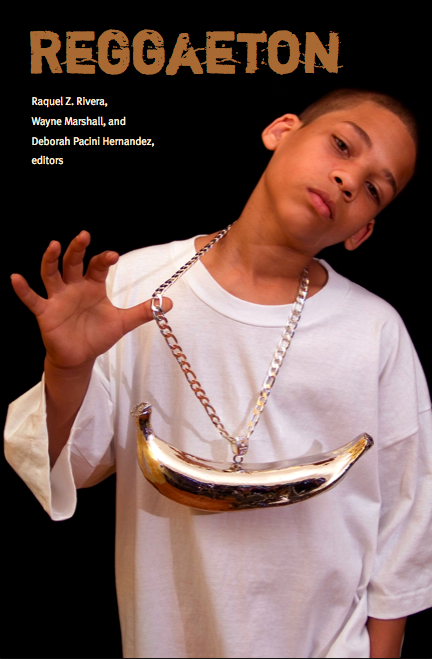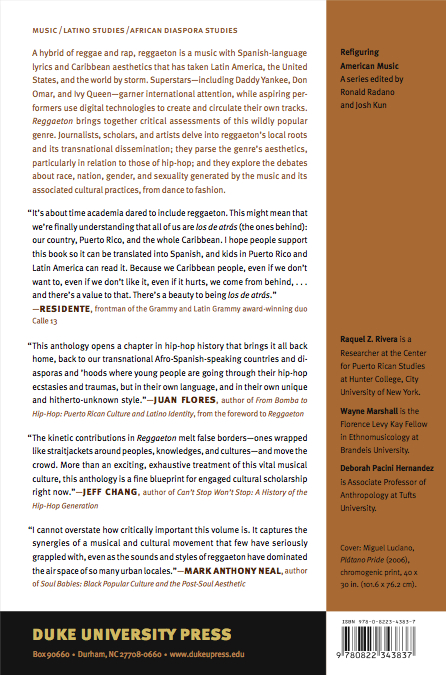Amazing how an Amazon link makes our book finally feel real. (Pre-orders in teh house!)
And though they don’t have any imgs yet, I’m happy to report that I do, and — having lobbied HARD for this particular photo by Miguel Luciano to grace our cover — I’m thrilled to share it with y’all:

On the other hand side, I may be as excited about the back cover as the front, since we were able to land such luminary thinkers and wordsmiths re: music and race and nation as Jeff Chang, Mark Anthony Neal, Juan Flores, and Residente (!).
…
Since I’m in a sharing mood, here’s a pdf of an article by Flores that makes a wonderful argument about diaspora “as source and challenge” what with its many “cultural remittances” “from below.” (Incidentally, Centro is offering many more pdfs at their site; see, e.g., the 2004 issue on “Rican Structing Roots / Routes,” from which this piece comes.)
Flores’s narrative centers on salsa and rap, but I’ve found the thesis utterly illuminating wrt reggaeton (as readers of my chapter in the book will see) —
…
& while I’m at it, here are two excerpts featured on a relatively recent Tego mixtape (almost a year old now, actually). I offer these up as each wonderful examples of how reggaeton “works,” if you will, consistent with the rich remix/reference culture that it is.
The first is a reworking of Fabolous’s unavoidable track from last year (and/or 2007), “Make Me Better” (incidentally, is it just me or does that central string motif sound awfully close to a recurring bit from the Lost score?). We hear here, among other things, how reggaeton artists — just as their “underground” bredren did in the 1990s — continue to version contemporary US/urban pop, translating and transforming the sounds that surround us:
>> Tego Calderón (feat. De La Ghetto), “Tú Me Haces Sentir”*
[audio:http://wayneandwax.com/wp/audio/Tego-Tu-Me-Haces-Sentir.mp3]
As you hear toward the end there, that track leads into a rowdy cumbia parody (sounding remarkably similar to a Manu Chao song in the chorus). I like how it shows reggaeton’s ability to incorporate / allude to other genres — and the “cultural work” inherent to such (re)figurations — not to mention how it shows off reggaeton’s (and Tego’s) sense of humor, with El Negro Calde putting on an extra coarse accent for “realism”:
>> Tego Calderón, “El Hijo’e Puta Sin Saludar”*
[audio:http://wayneandwax.com/wp/audio/Tego-El-Hijo-Puta-Sin-Saludar.mp3]
* for some reason, the tracks above sound distorted when listened to through the player; click on the song titles to hear more clearly.

great image! i seem to remember it from the show Infinite Island at the Brooklyn Museum in 2007? congrats, can’t wait to read book.
thx, annie! yes, miguel’s work was featured in that pan-carib/diaspora exhibit.
Congratulations, Wayne. On my wishlist now. Library ordered of course.
As impressive as the writer/academic blurbs are (and they are impressive) the one I’m most jealous of is from Residente.
Not that I need any seal of approval to know the excellence of the project. Are you coming to NYC for the Centro event in May?
Hee hee. Gotta admit I’m most psyched about that one too!
Yes, I’ll be there on May 7. Should be fun. One of several lil “launch” parties. Prolly the best one, with a DJ to boot!
That’s an interesting trail brought up by Juan Flores’s article. I’m reminded of the huge influence British/American bhangra and bollywood remix has had on Indian music in recent years.
One question pops into my head, which I think you might be the person to know more about: how does the English-speaking Caribbean relate and respond to what’s happened in the UK Caribbean diaspora? I know you’ve highlighted plenty of connections from the US to the Caribbean and back, but has Jungle, Garridge etc. fed back any to the islands, from which they’ve obviously nicked lots?
Pre-ordered!
I think Flores’s argument has lots of applications elsewhere, despite being so grounded in the special example that is Puerto Rico (i.e., with its particular/peculiar relationship to the US). The impact of modern bhangra and “remix” culture in India is another vivid story of “cultural remittances” from the diaspora.
I’ve actually been quite surprised by the apparent lack of UK (i.e., British-Jamaican, or Afro-British, or UK-Caribbean, etc.) influence back in Jamaica. Sure, one occasionally hears a flourish from drum’n’bass or London rave/club musics more generally, but nothing on par with hip-hop or r&b. Of course, I’m speaking pretty sweepingly here; I’m sure there’s more going on than that. One interesting example, for instance — and someone like John Eden would be better prepared to speak to this — might be the way that UK fast chat, initially inspired by flip-tongue talkover DJs from JA, returned to the island to spur something of a tongue-twisting arms race (to mix metaphors pretty horridly).
From another angle entirely, it’s pretty remarkable how little an impact reggaeton has made in Jamaica. Aside from the songs that made it into the American Top 40, you’d be hardpressed to find much awareness of the genre in Jamaica. Interestingly, the sites across the dancehall diaspora that seem to have any degree of presence/prominence in the JA imagination happen to be the ones that send emissaries to the island (in search of dubplates or DHQ contests): e.g., Japan, Germany.
like your blog.
the rowdy cumbia parody is originately from Lisandro Mesa, “el hijo de tuta”, Pope o the genre here in Colombia…Had to precise it cause a huge fan of him. Although it seems that Manu Chao sings in the chorus, the chorus sound not much different from the original one…
¡que interesante! gracias por la info —
I had no idea you co-authored this book man. huge props. I’m looking forward to reading this when it finally hits the shops. I missed you when you came out for j’ouvert. lemme know if your heading this way. I’ll try and line you up at Que Bajo.